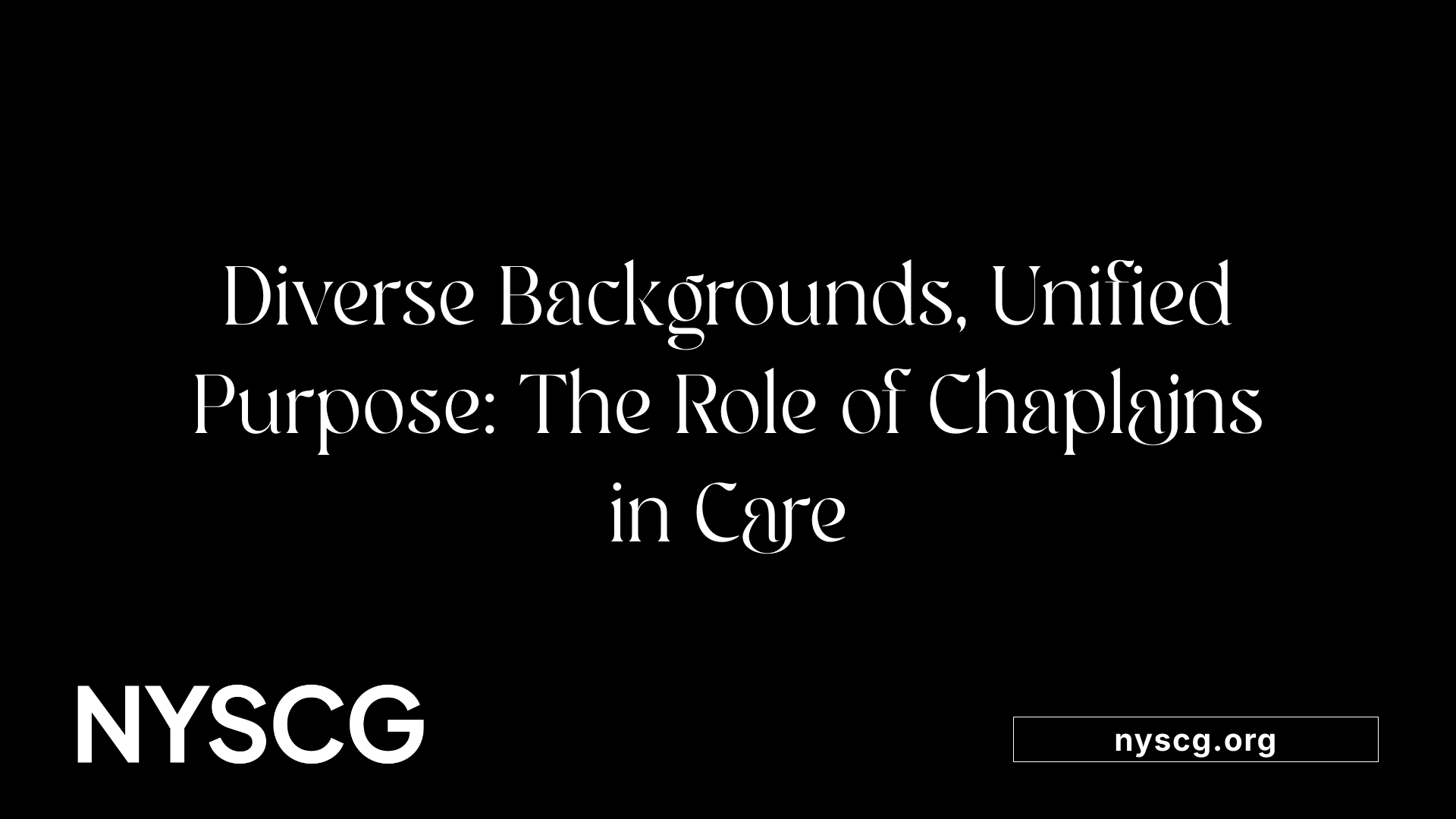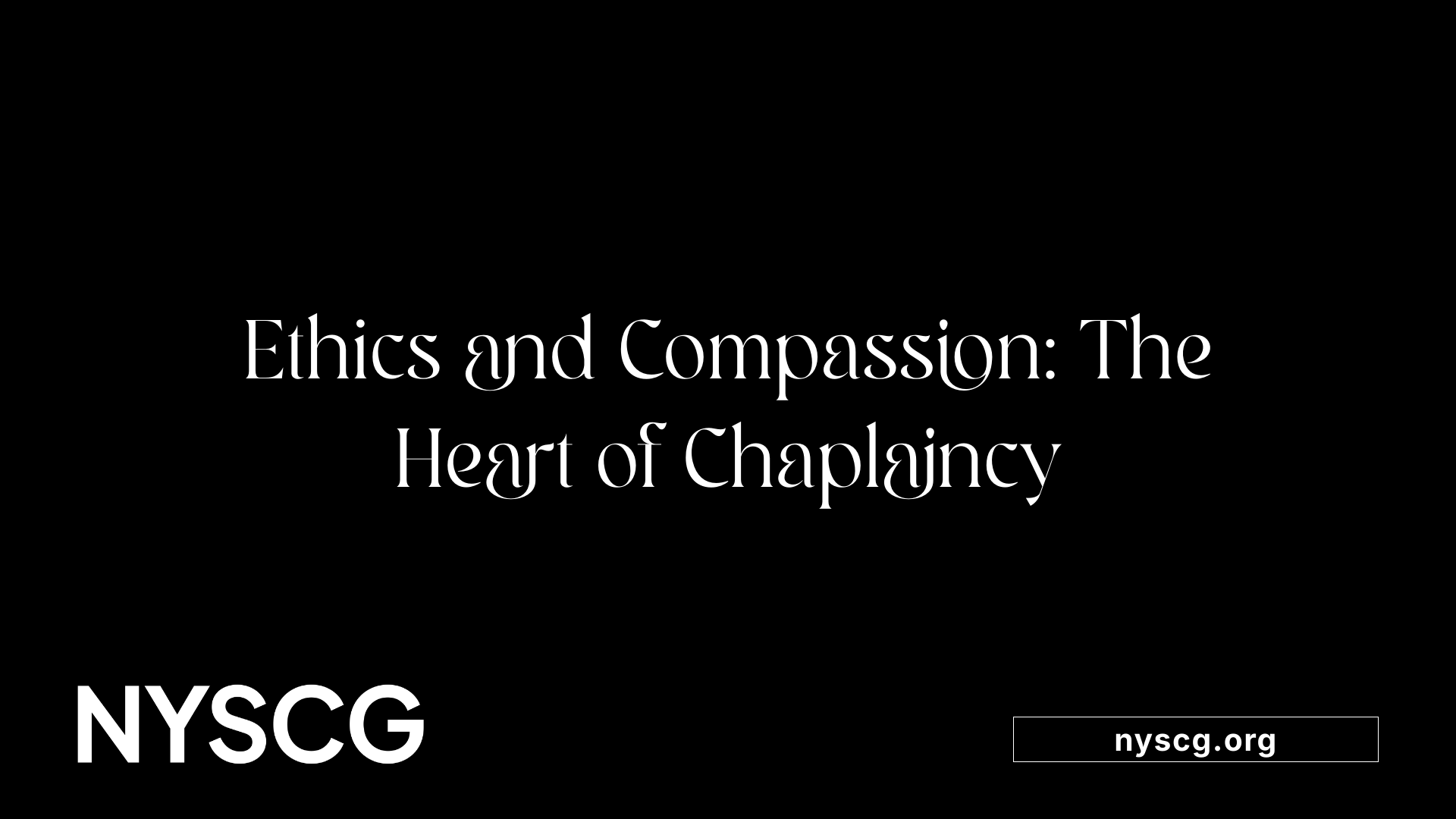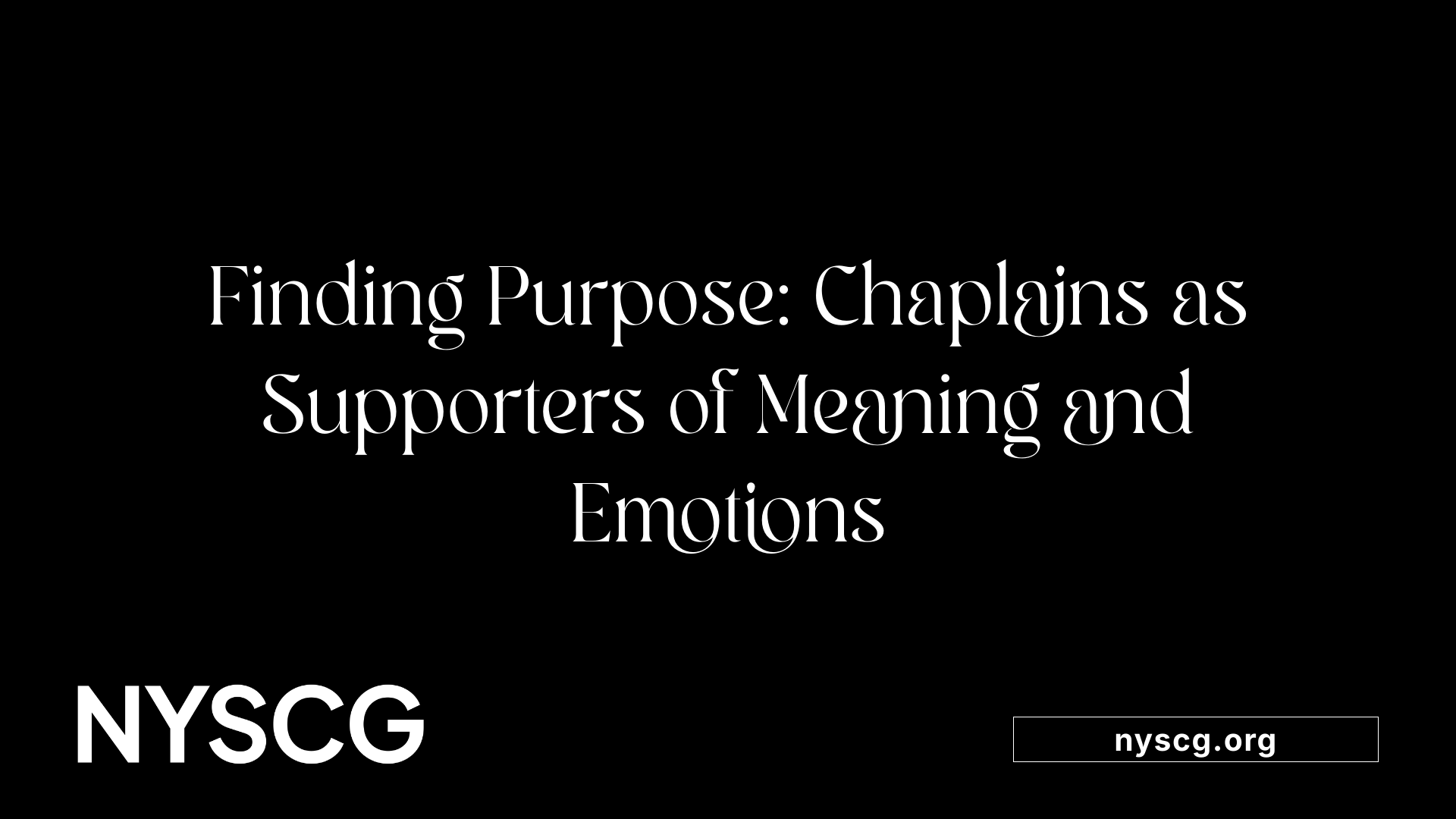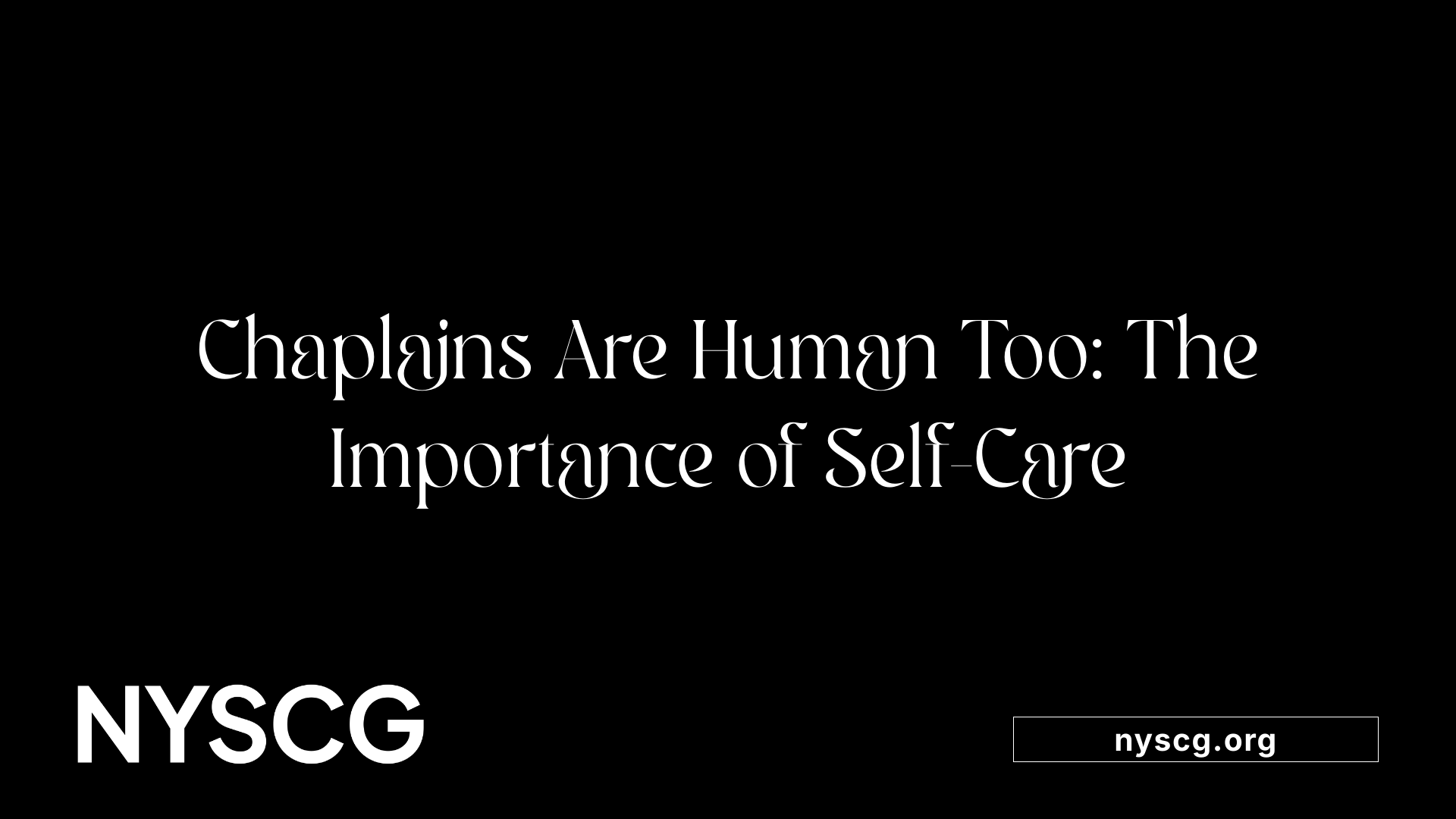Common Myths About Chaplain Certification Debunked


Chaplaincy is a vital spiritual and emotional support system across a broad spectrum of settings, from hospitals and military to correctional facilities and educational institutions. Despite its importance, many common myths and misconceptions about chaplain certification, roles, and practices persist. This article aims to debunk these myths, clarify the true nature of chaplaincy, and provide a comprehensive understanding of what qualified chaplains do, regardless of their religious or secular backgrounds.

Chaplains are essential figures in offering emotional and spiritual support in a variety of settings, including hospitals, military environments, law enforcement agencies, schools, and communities. They are trained to address spiritual distress, facilitate rituals, and provide counseling, regardless of a person’s religious background or belief system.
The backgrounds of chaplains are diverse. Many are not necessarily ordained clergy; instead, they often come from different spiritual or secular traditions. Most hold at least a bachelor’s degree, with a considerable number pursuing advanced theological or spiritual degrees, like a Master of Divinity (M.Div) or similar qualifications.
Training in clinical pastoral education (CPE) is a core component for many chaplains. CPE involves supervised practical experience where they learn to assess spiritual needs, deliver care, and collaborate effectively. Additionally, certification from professional organizations such as the Association of Professional Chaplains or the Healthcare Chaplaincy is often a requirement or a strong preference.
Chaplains possess a broad skill set that includes strong interpersonal skills, active listening, crisis intervention, and cultural competence. They are expected to serve individuals ranging from committed religious adherents to those identifying as agnostic or atheist.
Their roles are not limited to performing religious rites like baptisms or communion but extend to providing comfort, facilitating meaning-making, and supporting mental health. They often work as part of multidisciplinary teams, contributing a spiritual or emotional perspective to holistic care.
They are trained to operate within an interfaith and secular framework, respecting each individual's beliefs. They do not proselytize or impose religious beliefs but aim to support personal spiritual journeys in an ethically sound manner.
Overall, chaplains are equipped to meet the complex needs of diverse populations, advocating for spiritual well-being, resilience, and hope during times of crisis or transition.
| Backgrounds | Qualifications | Additional Skills | Focus Areas |
|---|---|---|---|
| Religious clergy | Ordination, theological degrees, CPE, certification | Religious rites, doctrinal teaching | Worship services, sacraments, religious rituals |
| Secular/spiritual helpers | Bachelor's degree (varied majors), some with advanced degrees | Active listening, cultural competence | Interfaith dialogue, secular humanist support, end-of-life care |
| Military chaplains | Military endorsement, CPE, security clearance, often later military training | Crisis response, counseling with a military focus | Supporting service members and families, morale and resilience |
| Community chaplains | Certification, community endorsement, specific training in crisis intervention | Community engagement, conflict resolution | Supporting diverse community needs, advocacy, emergency response |
Chaplains are trained in interfaith support, enabling them to serve individuals of all beliefs and backgrounds. They commonly utilize evidence-based assessment tools, such as the Spiritual Assessment and Intervention Model (AIM), to understand each person's unique spiritual needs. They support those with religious affiliations, as well as those who are non-religious, agnostic, or atheist.
Their work emphasizes dignity, respect, and personal meaning, with a focus on human connection rather than specific theological teachings. In doing so, they often facilitate conversations around purpose, hopes, fears, and emotional well-being, fostering a safe space for vulnerability.
Beyond traditional religious rites and worship services, chaplains perform a variety of functions:
Chaplains’ work often extends to helping individuals process bad news, celebrate good news, or simply provide companionship in times of uncertainty. Their approach is rooted in compassion, confidentiality, and respect for personal beliefs.
| Aspect | Details | Importance |
|---|---|---|
| Educational credentials | Bachelor’s degree, advanced degrees, CPE certification | Foundation for professional and ethical practice |
| Religious or secular training | Clergy ordination, secular certification, specialized training | Ability to serve diverse populations |
| Skills | Empathy, active listening, crisis intervention, cultural competence | Essential for effective spiritual and emotional support |
| Service scope | Religious rituals, counseling, advocacy, human connection | Adaptable to individual and group needs |
Understanding the rich diversity in backgrounds and qualifications among chaplains highlights their flexibility and essential role across many sectors. They are trained to provide support that respects each individual's beliefs and life stories, focusing on the human experience rather than specific religious doctrines.
A widespread misunderstanding is that all chaplains are necessarily ordained clergy or religious leaders. In reality, many effective chaplains do not hold ordination but are trained professionals who come from a broad spectrum of religious and non-religious backgrounds. This diversity enriches the care they provide, allowing them to better serve a wide range of individuals.
Another misconception is that certification is a universal requirement for all chaplains. The truth is that certification standards vary depending on the setting. For example, hospital chaplains often complete programs like Clinical Pastoral Education (CPE) and seek certification from recognized bodies, but this is not mandated everywhere. Military chaplains, meanwhile, have their own specialized training pathways, often through military academies or direct military training programs.
Many people assume that chaplains mostly attempt to convert patients or promote particular religions. However, professional chaplains are ethically bound to respect individual spiritual beliefs and non-belief. Their focus is on supporting personal meaning and emotional well-being, not on proselytizing.
It’s also commonly believed that chaplain visits are reserved for end-of-life care. In fact, chaplains regularly provide support across the entire spectrum of healthcare experiences. They are there to assist with emotional struggles, celebrate joys, and offer comfort in times of crisis, no matter the stage of treatment or health.
Lastly, many assume chaplains serve exclusively within religious organizations or churches. Today, they are found in secular environments like hospitals, military units, prisons, and workplaces. Their primary goal is to offer confidential, inclusive emotional and spiritual support to anyone in need, regardless of their faith or lack thereof.

Yes, many misconceptions exist about the role and scope of chaplaincy in settings such as the military and correctional institutions.
One widespread misconception is that chaplains only serve specific religious groups or focus on converting individuals to particular faiths. This is not true; chaplains are trained to provide religious and spiritual care across a wide range of beliefs, including non-religious perspectives like humanism, agnosticism, and atheism. They adhere to ethical standards that strictly prohibit proselytizing or attempting to impose religious beliefs.
Another false belief is that chaplains are only called upon in end-of-life or crisis situations. In reality, they offer ongoing, holistic support to individuals, helping them find meaning in their daily lives and addressing spiritual distress at any stage. Their presence is often integral to maintaining mental health and emotional wellbeing.
Some people think chaplains mainly serve as religious ministers who lead worship or perform rituals. However, their work extends far beyond these functions. Many chaplains focus on 'meaning-making,' engaging individuals in conversations about purpose, life experiences, and emotions. They support personal growth and understanding, respecting each person's unique spiritual journey.
A particularly common misconception is that chaplains aim to convert or influence individuals toward a specific religion. Ethical standards and training emphasize respecting the spiritual independence of each person, regardless of their religious background or lack thereof.
Recognizing these misconceptions helps clarify the vital role chaplains play in fostering well-being, providing emotional support, and respecting spiritual diversity in settings like the military and prisons. They serve as compassionate allies in the broader landscape of holistic care.
Chaplains provide spiritual care to all patients, even if they are not religious. Their focus is on helping individuals find meaning, cope with emotional distress, and navigate their experiences during healthcare. They do not require patients to adhere to any faith, nor do they attempt to convert or proselytize.
Chaplains engage in various activities including counseling, leading worship services, conducting rituals like baptism or communion, and supporting emotional well-being. They assist with significant life events, such as memorial services and room blessings, and support staff members as well.
Spiritual distress can happen at any point during an illness, not just at the end of life. It involves feelings of meaninglessness, guilt, or loss of purpose. Chaplains help patients explore these feelings, find personal significance, and foster resilience.
Most hospital chaplains are trained through Clinical Pastoral Education (CPE), which prepares them to work with diverse populations using interfaith models and evidence-based assessment tools like AIM. Many also have prior religious training or certification in specific faith traditions.
No, chaplains do not push their own beliefs or attempt to convert patients. They support individuals' spiritual journeys, respecting all faiths, including indigenous rituals like smudging, and non-religious perspectives.
Chaplains support holistic patient care by facilitating meaning-making, emotional support, and fostering human connection. They help patients explore what it means to be human, beyond traditional religious practices, often engaging in conversations about life, purpose, and feelings.
Chaplains are committed to respecting the spiritual and religious freedom of each person. They are bound by strict ethical rules against proselytizing and ensure confidentiality, including in sensitive contexts like confessions.
No, they are active in all areas of healthcare, providing ongoing support. The presence of a chaplain does not mean a patient is dying; they are part of the wider care team working on emotional and spiritual well-being.
Chaplains work collaboratively within interdisciplinary teams, sharing insights about a patient’s emotional and spiritual needs. They also serve staff, helping mitigate burnout and facilitate a supportive environment.
Yes, military chaplains serve all branches, providing spiritual guidance, conducting worship, and supporting soldiers and their families during deployment and recovery. They are trained to support individuals of all faiths and backgrounds.
Chaplains utilize models like AIM to evaluate individual needs and craft personalized support strategies. These approaches foster understanding, acceptance, and meaningful engagement in the person's spiritual journey.
Many misunderstandings about chaplains and faith-based initiatives stem from past negative experiences or cultural biases. Clear communication emphasizing their inclusive, non-proselytizing roles, and their commitment to respecting diverse beliefs, helps dispel these stereotypes.
Institutions can ensure transparency about their inclusive practices, highlight the diverse backgrounds of their spiritual care providers, and share research data demonstrating positive impacts on well-being and social cohesion. Educational outreach and open dialogue with communities can further foster acceptance.
| Aspect | Description | Additional Details |
|---|---|---|
| Support Scope | Counselling, rituals, emotional support | Includes support for staff and community events |
| Training | Clinical Pastoral Education (CPE), certifications | Emphasizes interfaith competence and ethics |
| Diversity | Christian, Jewish, Muslim, Buddhist, humanist, atheist | Supports all belief systems |
| Ethical Focus | Respect, confidentiality, non-proselytizing | Guided by professional and religious ethics |
| Deployment | Hospital, military, hospice, community | Serves varied settings and populations |
| Misconceptions | Religious coercion, exclusivity | Addressed through education and transparency |
Chaplains serve as bridges between spiritual diversity and healthcare needs. They cultivate trust, listen actively, and promote respect for individual beliefs, assisting in dispelling myths and fostering inclusive care environments.

Chaplains are committed to maintaining the highest standards of confidentiality and respect for individuals' spiritual and personal beliefs. This commitment is reinforced by military laws, healthcare policies, and professional codes of conduct. Personal conversations, confessions, and spiritual support sessions are protected, ensuring that patients and service members feel safe to share their innermost feelings without fear of disclosure.
Respect for individual differences is foundational in chaplaincy. Chaplains listen actively, accept diverse beliefs, and foster environments where vulnerability is welcomed. They aim to build trust, which is essential for meaningful support, especially when discussing sensitive issues such as spiritual distress, trauma, or emotional struggles.
Chaplains do not try to convert or persuade patients to adopt specific religious beliefs or practices. Their role is to support each person’s spiritual journey without imposing their own views. This non-proselytizing approach aligns with ethical standards and respects each individual's right to spiritual autonomy.
By focusing on individual needs, chaplains provide space for patients to explore their beliefs or find meaning in their experiences on their terms. For example, a chaplain might support a patient of no faith or a different religion without bias, ensuring open and accepting dialogue.
The work of chaplains centers around human connection and understanding. This approach emphasizes listening, compassion, and fostering safety for vulnerable individuals.
Chaplains see each person as a complete human being—beyond their health condition or religious labels. They engage in conversations about life, purpose, and feelings, helping patients find meaning amid suffering or uncertainty.
This human focus is evident in practices like emotional support during difficult news delivery, facilitating rituals that give comfort, or simply being present with someone in their moment of need. The goal is to promote well-being through genuine human interaction, respecting the individual's unique story and perspectives.
| Practice | Description | Purpose |
|---|---|---|
| Confidentiality | Protect all disclosures made during spiritual care | To foster trust and safety |
| Respect for Diversity | Support all spiritual paths without bias | To ensure inclusive, equitable care |
| Non-Proselytizing | Avoid attempts to convert or persuade | To uphold individual spiritual autonomy |
| Listening actively | Engage fully with patient stories | To understand needs and provide appropriate support |
| Emotional presence | Offer compassion and empathy | To ease distress and promote healing |
Chaplains' dedication to these principles ensures their work remains ethically sound and focused on compassionate, individualized care. Their role extends beyond religious practice to being a vital part of the holistic healing and comfort of patients and staff alike.
| Aspect | Ethical Guideline | Impact |
|---|---|---|
| Confidentiality | Protect all spiritual disclosures | Builds trust, encourages openness |
| Cultural & Religious Respect | Support diverse spiritual beliefs | Ensures inclusivity and dignity |
| Non-Proselytizing | Do not seek conversions | Respect personal autonomy |
| Human-centered Care | Focus on individual needs | Promotes meaningful connections |
By adhering to these standards, chaplains exemplify a compassionate approach rooted in respect, integrity, and human dignity.

Chaplains play a vital role in fostering overall health, extending their support beyond traditional religious practices. They focus on supporting the whole person, including emotional, psychological, and spiritual dimensions. Their presence provides comfort and stability during challenging times, whether patients are facing illness, recovery, or end-of-life scenarios. By addressing spiritual distress that can occur at any stage of health care, chaplains help individuals find a sense of peace and purpose amidst difficult circumstances.
One of the core activities of chaplains involves engaging in meaningful conversations that delve into issues such as purpose, identity, and emotional resilience. They listen actively, helping patients and staff articulate their fears, hopes, and values without imposing any particular belief system. This process, known as 'meaning-making,' allows individuals to explore what matters most to them, fostering emotional strength and clarity. Chaplains also support those receiving both good news and bad, providing compassionate presence and guidance for processing complex emotions.
Chaplains work closely within healthcare teams, sharing insights gathered from spiritual assessments with other professionals like doctors, nurses, and mental health experts. This collaboration ensures that the emotional and spiritual needs of patients are integrated into overall care plans. Most hospitals employ trained chaplains familiar with evidence-based models such as the Spiritual Assessment and Intervention Model (AIM), which guides them in evaluating and responding to diverse spiritual needs.
Chaplains do far more than conduct scripture readings or rituals like baptisms and communion. They focus on supporting holistic well-being by engaging in meaningful conversations that explore life, purpose, and emotions. Their activities include listening actively to concerns, fostering emotional resilience, and helping individuals find meaning in their experiences during health crises or life transitions. They utilize structured assessment models like AIM to personalize support. Additionally, they often organize memorial services, facilitate room blessings, and support staff emotionally, ensuring that care incorporates both spiritual and emotional aspects.
Chaplains support individuals from all backgrounds — Christian, Jewish, Muslim, Buddhist, non-religious, humanist, agnostic, and atheist. Their emphasis is on respecting each person's unique spiritual journey without proselytizing or imposing beliefs. They are trained in interfaith care and are committed to affirming religious and spiritual diversity, including culturally specific rituals like Native American smudging.
Besides patient interactions, chaplains serve hospital staff and the community through emotional support and organizing various ceremonies that nurture a caring environment. They foster understanding and vulnerability, which can help reduce biases, enhance team cohesion, and improve overall well-being.
Chaplains' work integrates emotional, spiritual, and relational elements into healthcare, emphasizing that healing encompasses more than just physical recovery. Their focus on 'meaning-making' helps patients and staff find significance in their experiences, fostering resilience and hope.
| Activities of Chaplains | Focus Areas | Additional Details |
|---|---|---|
| Conducting rituals | Religious & cultural support | Includes baptisms, communion, Native rituals |
| Spiritual assessments | Needs evaluation | Using models like AIM to tailor support |
| Emotional listening | Emotional resilience | Supporting patients through fears, hopes, and grief |
| Meaning-making conversations | Purpose & identity | Exploring life, purpose, and personal values |
| Memorial services & blessings | Community & staff support | Foster a compassionate environment |
| Collaboration with healthcare teams | Holistic care | Share insights for comprehensive wellness |
Chaplains' roles extend into every part of patient care, emphasizing that emotional and spiritual support are integral to healing and well-being. Their work champions the understanding that addressing the human spirit is essential for a complete approach to health care.

A prevalent misunderstanding is the idea that chaplains are spiritual beings endowed with innate enlightenment or mystical powers. Such beliefs can elevate their role beyond what it truly is—humans dedicated to providing support and care.
In reality, chaplains are everyday professionals, much like healthcare providers, who undergo rigorous training, including Clinical Pastoral Education (CPE). They are humans with their own vulnerabilities, emotions, and needs for self-care. Recognizing this helps shift the perception from an almost superhuman figure to a relatable, empathetic individual.
Addressing societal misconceptions involves modestly educating communities about what chaplains do, emphasizing their extensive training, ethical guidelines, and their fallibility. They are bound by strict codes that prohibit proselytizing, ensuring respect for diverse beliefs, including non-religious perspectives.
Public stories and transparent communication about chaplains' experiences can foster understanding. Sharing diverse backgrounds—for example, Christian, Jewish, Muslim, Buddhist, humanist, or atheist—demonstrates that chaplaincy is welcoming and inclusive.
Furthermore, highlighting that chaplains are active in self-care, ongoing education, and professional development showcases their human side. They balance compassion with personal wellness, recognizing that their effectiveness depends on their own mental and emotional health.
In sum, dispelling stereotypes about spiritual superiority and emphasizing the human, fallible nature of chaplains helps build trust. It fosters respect for their role as compassionate, ethical caregivers who serve all persons regardless of faith or background.
Chaplains, as humans, require regular self-care to prevent burnout and maintain their ability to support others effectively. Self-care practices include peer support, supervision, continuing education, and personal reflection.
Understanding their human limits encourages chaplains to seek help and balance their work-life dynamics. When communities recognize the human aspect of chaplains, it enhances appreciation for their dedication, humility, and professionalism.
Ultimately, acknowledging the personal humanity of chaplains enriches their work and strengthens trust within the healthcare and military systems where they serve.
Debunking myths about chaplain certification and roles reveals a profession rooted in compassion, diversity, and ethical integrity. Recognizing the broad scope of their work and the varied backgrounds of chaplains helps dispel stereotypes and highlights their essential contribution to holistic care. Whether in military, healthcare, correctional, or community settings, chaplains are committed to serving all individuals respectfully and thoughtfully, emphasizing meaning-making, emotional support, and human connection beyond religious boundaries. As misconceptions fall away, understanding deepens, and the essential role of chaplains in fostering resilience, hope, and inclusivity becomes more appreciated by the wider community.
All you need is the will to make the world a better place.
New York State chaplain group inc. is a tax deductible organization with a federal tax Id number 92-383-4921